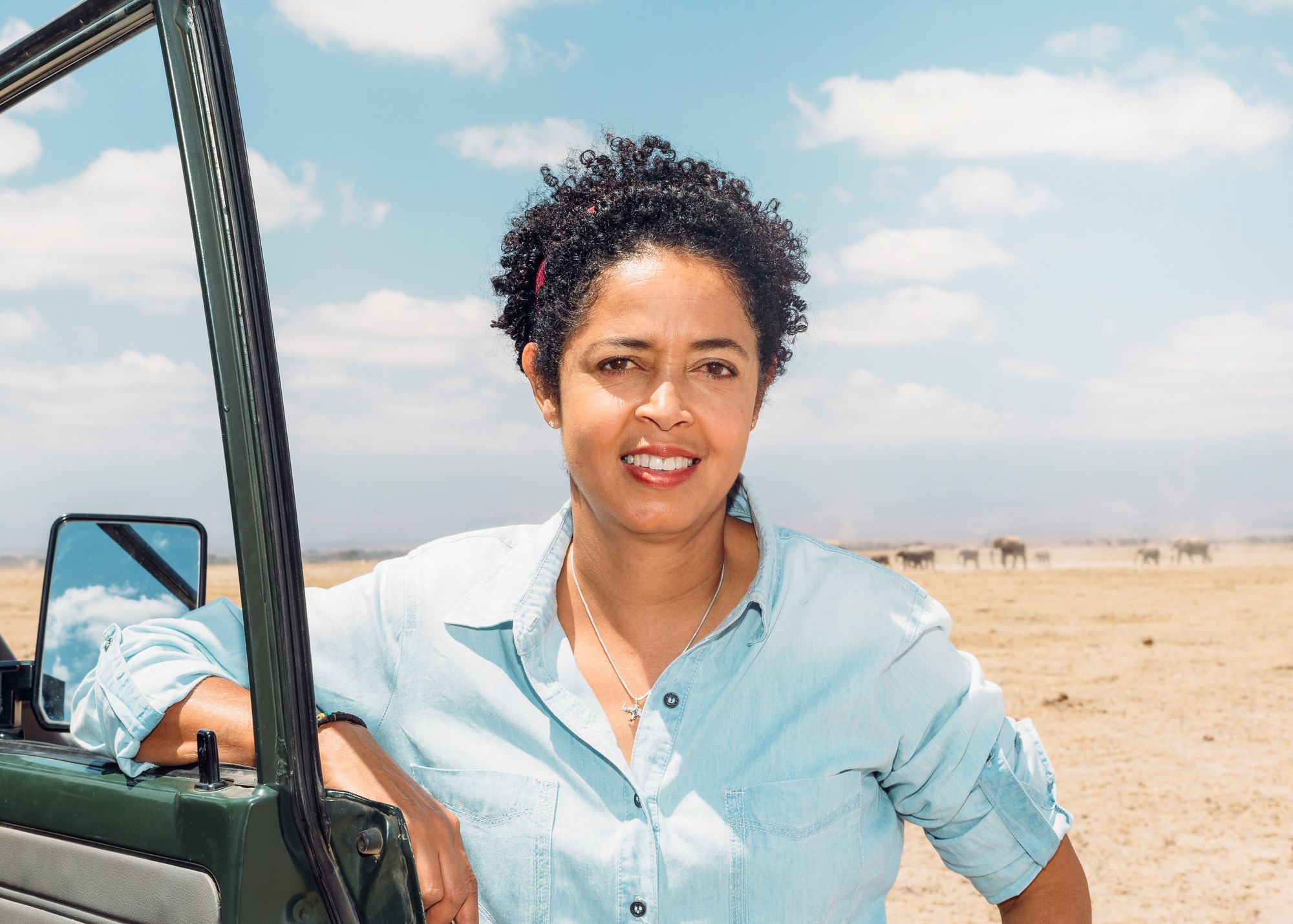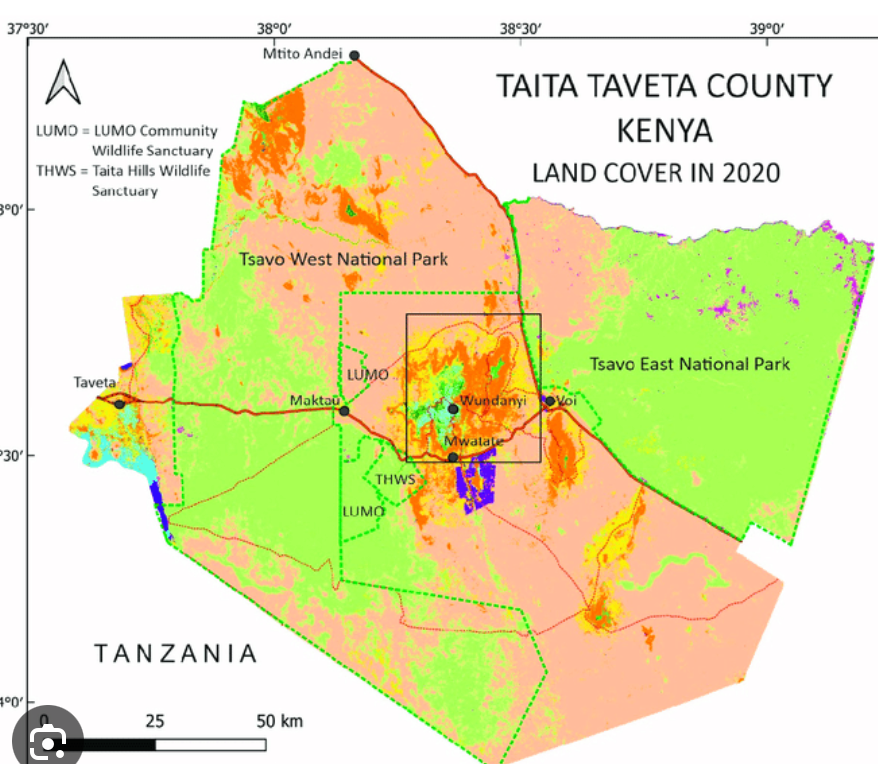Sharing Revenue from Tsavo National Park: A Game-Changer for Kenya's Wildlife Conservation? My take.
President Ruto's decision to share national park revenue with the Taita-Taveta county is a bold potentially transformative step, but is it sustainable?

The Tsavo National Parkat 22,000 km² is the largest in East Africa, and is comprised of two parks - Tsavo East and Tsavo West separated by the Mombasa highway and railway. The parks lie mostly in the Taita-Taveta county taking up 62% of it's land area . Famed for the red elephans, and maneless lions, Tsavo, is one of the most magical places on earth described on the KWS website as "The sight of dust-red elephant wallowing, rolling and spraying each other with the midnight blue waters of palm-shaded Galana River is one of the most evocative images in Africa. This, along with the 300 kilomtere long Yatta Plateau, the longest lava flow in the world, make for an adventure unlike any other in the Tsavo East. The park forms the largest protected area in Kenya and is home to most of the larger mammals, vast herds of dust –red elephant, Rhino, buffalo, lion, leopard, pods of hippo, crocodile, waterbucks, lesser Kudu, gerenuk and the prolific bird life features 500 recorded species."

It's an open secret that the County of Taita-Taveta has been agitating for revenue from the park from the Kenyan wildlife Authority, the Kenya Wildlife Service, for years. The Tsavo National Park has failed, in their opinion, to meaningfully contribute to the aspirations of people in the county. The state has been accused of failing to address devastating conflict with wildlife, grabbing and exploiting mineral rich land, and have even gone so far as accusing KWS of poaching. KWS manages the Tsavo Park, it' is a premier tourist destination and home to many super tuskers, as well as being one of the nations largest rhino sanctuaries.
But this week, Kenya's President William Ruto's, announced a decision to split half of the revenue collected from Tsavo National Parks with the Taita Taveta county which has its potential benefits and drawbacks. The move comes as Kenya's wildlife faces a myriad of threats, and this blog post aims to explore the pros and cons of this decision for Kenya, its impact on other parks, wildlife conservation in general, public support for nature, and its potential as a model for Africa.
Here's my take
The Fantastic Opportunities:
1. Incentivizing Local Conservation Efforts: By sharing the revenue with the Taita Taveta communities, this could foster a sense of ownership and create a stronger incentive for them to actively participate in protecting the park and its wildlife. This could lead to increased vigilance against poaching, illegal activities, and encroachments on the park's land.
2. Socio-Economic Development: The revenue-sharing arrangement can contribute to the economic development of the Taita Taveta communities. This deal would allow the county to meaningfuly engage in decideing on innovative new financial instruments like carbon and biodiversity credits. This first of it's kind deal in Kenya, may even attract renewed donor support in light of the courageous step taken by teh central government. The economic boost may reduce their reliance on the park's resources for livelihoods, thus easing human-wildlife conflicts.
3. Enhanced Political and Public Support for Conservation: Involving local communities in the conservation process can foster a sense of ownership and responsibility for the park's welfare. This may lead to greater county government and public support for wildlife protection efforts and garner political backing for future conservation initiatives.
The Terrifying Threats:
1. Potential Financial Strain on Conservation: Allocating half of the park's revenue to the communities might lead to reduced funding for critical conservation efforts within the park. This could threatean already underfunded initiatives such as anti-poaching measures, habitat restoration, and wildlife research. for example, will the county also shoulder the 50% of burden of costs such as management, human wildlife conflict and enforcement?
3. Governance and Accountability: Kenya is renown for widespread corruption. Ensuring transparent and accountable distribution of the shared revenue is crucial. Without effective oversight and management, there's a risk of misuse or misallocation, which could undermine the intended benefits. But combating corruption in state agencies and county's will require sustained efforts from all stakeholders to improve accountability mechanisms, transparency in procurement practices, ethics in dealing with anti corruption, leveraging technology, citizen participation, whistelblowing incentives, political will to deal with offenders decisively, stronger judicary, and embracing civil society and media.
4. Sustainabile Revenue Generation: The park's financial sustainability relies on revenue from tourism and other activities. If the revenue sharing affects park operations negatively, it may compromise its capacity to conserve wildlife effectively.
My take:
The decision to share the parks revenuw is the first of it's kind in Kenya which, if done right, could transform the future of wildlife conservation in Kenya, and be an exciting new model for Africa. I'm most excited about how this initative could foster greater community engagement in conservation while promoting wildlife protection on a larger scale.
Kenya's decision might set a precedent for other African nations facing similar challenges in wildlife conservation. This approach could provide valuable insights into balancing conservation needs with community development. I certainly hope that once the people get a taste of owning the parks, they will also appreciate and use the parks, which until hnow have been largely designed and managed for international tourists.
None of us can appreciate how profound this decision could be for Kenya: If it works, it could transform public support for nature: By involving local communities, this decision may increase awareness about the importance of wildlife conservation and garner public support for nature's protection beyond Tsavo National Park. This will completely change the perspective that the parks are owned by KWS, translate into corporate support.
President Ruto's decision to share revenue with the Taita Taveta communities represents a bold step towards addressing the threats faced by Kenya's wildlife. While the move offers potential benefits in terms of incentivizing conservation and promoting socio-economic development, it also raises concerns about sustainable funding for conservation efforts and governance. But, I'm sure he has some tricks up his sleeve. As a Kenyan conservationist, I'm breathing a huge sigh of relief... this solution was way overdue. However, it will be crucial to monitor the implementation progresses, and evaluate the outcomes carefully, learn from the experience, and adapt the model accordingly. Ultimately, if successful, this approach could serve as a beacon of hope for wildlife conservation in Africa, demonstrating that public participation, local government partnership and community involvement can be powerful tools in safeguarding the continent's natural treasures.